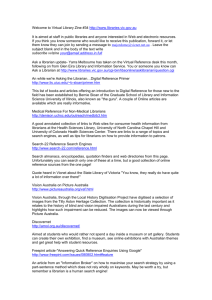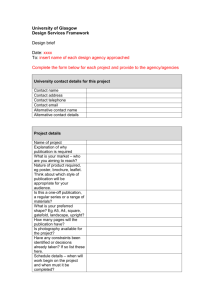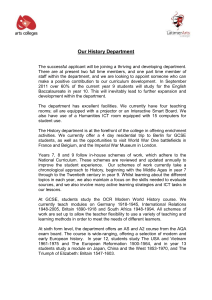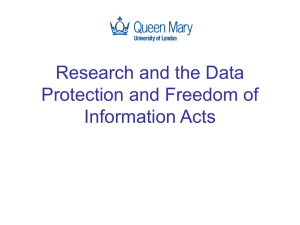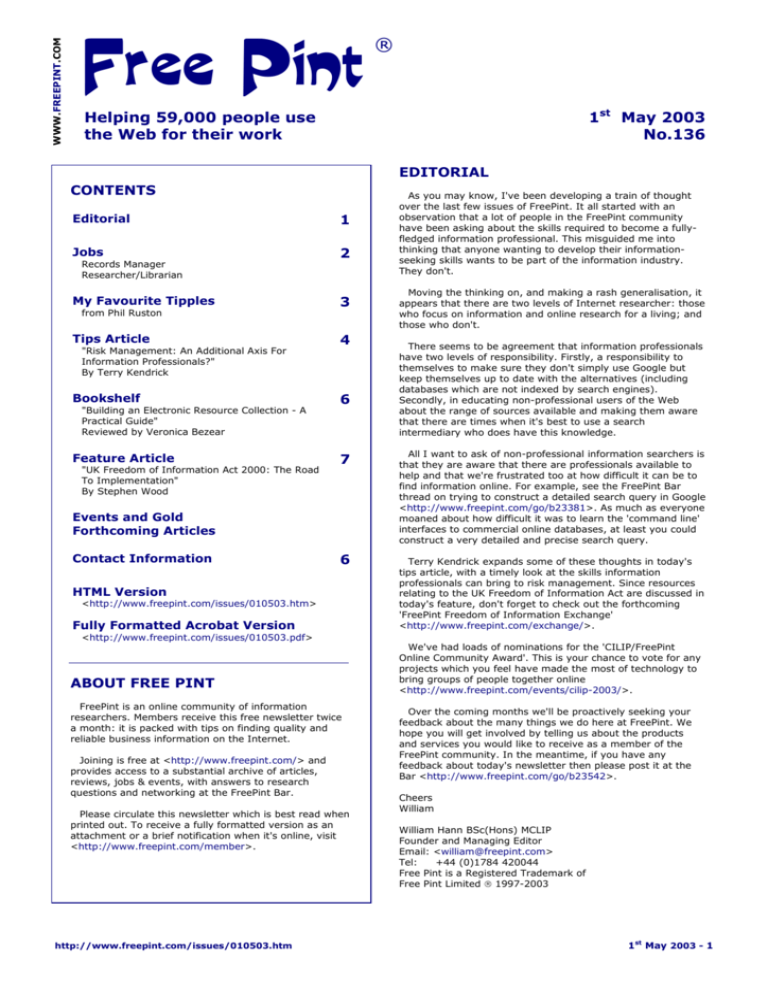
WWW.FREEPINT.COM
Free Pint
®
1st May 2003
No.136
Helping 59,000 people use
the Web for their work
EDITORIAL
CONTENTS
Editorial
1
Jobs
2
My Favourite Tipples
3
Records Manager
Researcher/Librarian
from Phil Ruston
Tips Article
4
Bookshelf
6
"Risk Management: An Additional Axis For
Information Professionals?"
By Terry Kendrick
"Building an Electronic Resource Collection - A
Practical Guide"
Reviewed by Veronica Bezear
Feature Article
"UK Freedom of Information Act 2000: The Road
To Implementation"
By Stephen Wood
7
Events and Gold
Forthcoming Articles
Contact Information
6
HTML Version
<http://www.freepint.com/issues/010503.htm>
Fully Formatted Acrobat Version
<http://www.freepint.com/issues/010503.pdf>
ABOUT FREE PINT
FreePint is an online community of information
researchers. Members receive this free newsletter twice
a month: it is packed with tips on finding quality and
reliable business information on the Internet.
Joining is free at <http://www.freepint.com/> and
provides access to a substantial archive of articles,
reviews, jobs & events, with answers to research
questions and networking at the FreePint Bar.
Please circulate this newsletter which is best read when
printed out. To receive a fully formatted version as an
attachment or a brief notification when it's online, visit
<http://www.freepint.com/member>.
http://www.freepint.com/issues/010503.htm
As you may know, I've been developing a train of thought
over the last few issues of FreePint. It all started with an
observation that a lot of people in the FreePint community
have been asking about the skills required to become a fullyfledged information professional. This misguided me into
thinking that anyone wanting to develop their informationseeking skills wants to be part of the information industry.
They don't.
Moving the thinking on, and making a rash generalisation, it
appears that there are two levels of Internet researcher: those
who focus on information and online research for a living; and
those who don't.
There seems to be agreement that information professionals
have two levels of responsibility. Firstly, a responsibility to
themselves to make sure they don't simply use Google but
keep themselves up to date with the alternatives (including
databases which are not indexed by search engines).
Secondly, in educating non-professional users of the Web
about the range of sources available and making them aware
that there are times when it's best to use a search
intermediary who does have this knowledge.
All I want to ask of non-professional information searchers is
that they are aware that there are professionals available to
help and that we're frustrated too at how difficult it can be to
find information online. For example, see the FreePint Bar
thread on trying to construct a detailed search query in Google
<http://www.freepint.com/go/b23381>. As much as everyone
moaned about how difficult it was to learn the 'command line'
interfaces to commercial online databases, at least you could
construct a very detailed and precise search query.
Terry Kendrick expands some of these thoughts in today's
tips article, with a timely look at the skills information
professionals can bring to risk management. Since resources
relating to the UK Freedom of Information Act are discussed in
today's feature, don't forget to check out the forthcoming
'FreePint Freedom of Information Exchange'
<http://www.freepint.com/exchange/>.
We've had loads of nominations for the 'CILIP/FreePint
Online Community Award'. This is your chance to vote for any
projects which you feel have made the most of technology to
bring groups of people together online
<http://www.freepint.com/events/cilip-2003/>.
Over the coming months we'll be proactively seeking your
feedback about the many things we do here at FreePint. We
hope you will get involved by telling us about the products
and services you would like to receive as a member of the
FreePint community. In the meantime, if you have any
feedback about today's newsletter then please post it at the
Bar <http://www.freepint.com/go/b23542>.
Cheers
William
William Hann BSc(Hons) MCLIP
Founder and Managing Editor
Email: <william@freepint.com>
Tel:
+44 (0)1784 420044
Free Pint is a Registered Trademark of
Free Pint Limited 1997-2003
1st May 2003 - 1
Free Pint
®
JOBS
FREE PINT JOBS
<http://www.freepint.com/jobs>
FreePint Jobs -information-related
jobs in one place.
VACANCY SEARCHING
-- free search and set
up a weekly alert
profile.
VACANCY RECRUITING
-- post a vacancy for
GBP 195 (EUR 285,
US$300).
Find out more today at
<http://www.freepint.c
om/jobs>
This week's selected listings are below. All new
jobs are posted to the Bar and Bar Digest
(circulation 10,000+). This week's is at
<http://www.freepint.com/go/b23515> and last
week's at
<http://www.freepint.com/go/b23437>.
Here are some of the latest featured jobs:
Records Manager
<http://www.freepint.com/go/j2437>
Exciting RM role at top bank, jointly
managing the team & responsible
for workflows & quality - great salary &
benefits on offer.
Recruiter: Sue Hill Recruitment
Researcher/Librarian
<http://www.freepint.com/go/j2431>
Bright Researcher required by friendly, niche
North London Human Resources
Consultancy.
Recruiter: Glen Recruitment
[The above jobs are paid listings]
Find out more today at
<http://www.freepint.com/jobs>
Free Site About Unstructured
Information Management
Unstructured Information Management consists
of the tools and methods necessary to Store,
Access & Retrieve, Navigate, and Discover
Knowledge in text-based information. Knowledge
about this new area is rapidly becoming a vital
skill for all researchers and information
professionals <http://www.unstruct.org>.
FreePint Financials
<http://www.freepint.com/icc>
Research UK companies and company directors
using FreePint's comprehensive database. It's
free to search and see basic details. In-depth
reports are available to purchase.
http://www.freepint.com/issues/010503.htm
FreePint Freedom of
Information Exchange
22nd July 2003, London, UK
This seminar will provide an overview of the
Freedom of Information Act. The session will
cover: practical issues to consider when
implementing FOI; discrepancies between the
Data Protection and Freedom of Information
regimes; the role of the publication scheme;
records management issues; handling FOI
requests; right of appeal, complaints procedures
& compliance matters; copyright issues.
http://www.freepint.com/exchange/fi220703.htm
Free Trial of Cogenta’s
Research Director to FreePint
Members Only
Director is a desktop research management
environment giving a single point of access to
your internal and external information sources,
even including subscription databases and the
Deep Web. Create your own 'intelligent agents' to
do the research for you; run multiple search
queries simultaneously; store and manage your
research and more. This is far more than a metasearch tool. For your free trial, go to:
http://www.cogenta.com/form/free_trial.htm
The CILIP/FreePint Online
Community Award
Since group communication and support online
have become so important, the Online
Community Award is your chance to nominate
any online community project from any sector
that has brought people with common interests
together in a virtual environment:
<http://www.freepint.com/events/cilip-2003/>
1st May 2003 - 2
Free Pint
®
FAVOURITE TIPPLES – BAR – EVENTS
MY FAVOURITE TIPPLES
from Phil Ruston
Phil Ruston works for
the British Library
Business Information
Service. He manages
the business reading
room and is responsible
for maintaining the
pages at
http://www.bl.uk/bis
Tell us about your
favourite Web sites.
Check out the
guidelines at
<http://www.
freepint.com/
author.htm>, then
email <penny@
freepint.com>.
• ADVFN <http://www.advfn.com/> - My
preferred choice for stock market quotes. If you
can ignore the inevitable 'ramping', the bulletin
boards can be a first for breaking company
news.
• Motley Fool <http://www.fool.co.uk/> - The
Fool doesn't take itself too seriously. Attend the
Fool School to learn about investing and then
consult the advice on how to get out of debt!
• Askalix <http://www.askalix.com/> - First port
of call for checking company contact details.
Produced in association with Dun & Bradstreet,
Europe's largest online business directory
usually comes up with the answer.
• BigCharts
<http://bigcharts.marketwatch.com/> Excellent interactive charting and invaluable
access to historical quotes. Complements
Yahoo! Finance and keeps our student users
very happy.
• Sporting Life <http://www.sporting-life.com/> All the key sporting facts and figures in one
place - the results service is incredibly fast.
Almost compensates for the demise of the old
print copy.
FREE PINT BAR
In Association with Factiva
a Dow Jones & Reuters Company
The FreePint Bar seems to get a good mix of
those topics which arise time and again and those
which are being discussed for the first time, even
after 20,000 questions and answers.
For the former, don't even mention the
numerous 'Help with my dissertation topic'
postings at the Student Bar. For the latter,
though, there was an item recently about
summarising newsgroup discussions
<http://www.freepint.com/go/b23353>. It's an
interesting question, especially since the
prevalence of discussion groups and blogs means
we may yet need another level of such sites to
summarise the latest from the sites summarising
the latest from other sites!
On other topics: Do you know of any research
on the usability of 'rating' systems?
<http://www.freepint.com/go/b23409>; How
about the cost savings of performing surgical
procedures for outpatients rather than inpatients?
<http://www.freepint.com/go/b23478>.
• The FreePint Bar is a free resource for
FreePinters to help each other with information
queries <http://www.freepint.com/bar>.
• Help for students on information-related
courses is available at the FreePint Student Bar
<http://www.freepint.com/student>.
• To have the latest postings come to you
automatically by email, sign up for the twiceweekly email digest
<http://www.freepint.com/member>.
http://www.freepint.com/issues/010503.htm
See you at SLA in New York!
Factiva is proud to sponsor keynote speaker
Madeleine Albright, the former US Secretary of
State on Wednesday, June 11. In addition Factiva
is also sponsoring two pre-conference events on
Sunday, June 8 entitled "Beyond Marketing:
Consultative Strategies for Information
Professionals" and "Learning is Hot: Simple, CostEffective Tools & Tips for Building Effective
Learning Programs." To get more information,
visit www.sla.org. Hope you can be there!
EVENTS
<http://www.freepint.com/events>
The AIIP Annual Conference is on the 1st-4th
May in Providence, RI, US
<http://www.freepint.com/go/e169>. It "...
provides opportunities to meet leaders in the
information industry, develop contacts for
subcontracting, attend pre-conference seminars
as well as free vendor training, and learn about
the latest information products".
Aslib Engineering Group AGM and tour around
the recently refurbished IEE Library of the IEE
library is on the 1st May in London
<http://www.freepint.com/go/e202>.
The Mobilising Knowledge 2003 conference is
on May 8th, organised by Aslib/IMI and taking
place in London. For anyone interested in
knowledge management
<http://www.freepint.com/go/e185>.
STN will be hosting two free patent forums, in
Cambridge on Tuesday 13 May and in
Manchester on Friday 16 May
<http://www.freepint.com/go/e182>. "These
sessions will provide an overview of patent
searching on STN and the databases available."
The SLA European Chapter is holding a meeting
on the 13th May in London
<http://www.freepint.com/go/e192>. Factiva will
share aspects of best practice in taxonomy
design and talk about Factiva Intelligent
Indexing.
The Aslib IT&C Group Conference is on the
14th-16th May in Chelmsford, Essex
<http://www.freepint.com/go/e194>.
The Scottish Law Librarians Group have
organised a full day course titled 'Taking Stock
and Going Places' on the 15th May in Edinburgh
<http://www.freepint.com/go/e198>.
If you are in California on the 19th-22th May
go along to 'CPweek: annual conference of the
CoP on CoPs' organised by CPsquare
<http://www.freepint.com/go/e184>.
The Society of Public Information Networks
(SPIN) have organised 'epi2003 - Engaging the
user: e-Information and e-Services' on the 22nd
May at the National Motorcycle Museum, Solihull.
"Meet and discuss today's issues in electronic
public information"
<http://www.freepint.com/go/e203>.
Submit details of your event today for free
promotion. Simply complete the form at
<http://www.freepint.com/events>.
1st May 2003 - 3
Free Pint
®
TIPS
TIPS ARTICLE
<http://www.freepint.com/issues/010503.htm#tips>
"Risk management: an additional axis for information professionals?"
By Terry Kendrick
Information professionals are increasingly
recognising that information only has significant
value when it is being used. Collections and
access to databases do have some intrinsic value
but will often, in themselves, be judged more as
a cost than a value.
Terry Kendrick is
Director of Information
Now Ltd
<http://www.terrykend
rick.co.uk>. He
originally trained as a
librarian in the late
1970s but since the
mid 1980s has been
freelance initially as an
information broker and,
since 1990 as a
marketing planning
consultant. He has
worked on assignments
for over 50 large
organisations in 17
different countries. He
still maintains close
contact with the library
and information world
and regularly presents
workshops for the
Chartered Institute of
Library and Information
Professionals (CILIP) as
well as doing
occasional strategic
planning-related
consultancy for library
and information
services.
Terry teaches modules
on the University of
East Anglia executive
MBA and is currently
undertaking a PhD in
risk management
applications in strategic
marketing planning.
The trick for information professionals, of
course, is to base their activities clearly and
unambiguously around moving their
organisations forward. Weasel words such as
"added value" are to be avoided as, often, these
no longer have the desired effect of a decade ago
unless backed up with real outcomes. Much
better is to clearly find the axes of value creation
in the organisation (doesn't matter if it is a "for
profit" or "not for profit" organisation - these
axes will be there) and lock your services on to
these axes.
In recent times risk management has become a
central concern of most organisations, whether in
the private or public sector. This is certainly
evident in my consulting activities where I see
risk management now as a fundamental part of
board and senior management team
responsibilities.
However, although "front of mind" in many
organisations, there appears to be little formal
relationship between risk management and inhouse information services. A number of parts of
the information supply chain have recognised this
need and are now offering products directly
supporting risk management activities. See Lexis
Nexis' 'Thindex' as an example of this
<http://www.lexisnexis.com/riskwise/thindex>.
Are library and information units offering risk
management support? Or are we being bypassed
in the supply chain for risk management
information support?
Clearly here is an opportunity to align the
information service with a core organisational
concern. To simply believe that, implicitly, the
information service is there to support these
concerns is to miss a great opportunity to make
the connection explicit. Organisations have to
manage risk; and the process of identifying,
analysing, evaluating, treating and monitoring
risk is very information-intensive. Why wait for
the board or senior managers to recognise your
role? Push it.
A number of factors in the organisational
environment have combined to catapult risk
management onto the management team
agenda. These factors include:
• Political unrest / terrorism
• Industry rivalry requiring more risks to be taken
to win good business
• Globalisation
• Corporate governance / recent scandals
• Stakeholders expectations (in both profit and
non-profit organisations)
The UK government is also keen to improve its
responses to risk and in November 2002 the
Cabinet Office published its extensive report on
"Risk: improving government's capability to
handle risk and uncertainty"
http://www.freepint.com/issues/010503.htm
<http://www.cabinetoffice.gov.uk/innovation/2002/risk/risk/home.ht
ml>.
Every process and activity within an
organisation has risk associated with it. Some of
the more immediate risks are:
• Strategic positioning, development,
deployment, reputation and review
• Corporate governance: accounting, disclosure,
regulatory & compliance
• Market (financial): interest rates, credit risks,
currency risk, investments, liquidity
• Operations: process risk, supply chain risks
• Systems and information technology
• Human resources and management, labour
strikes
• Market (marketing) - new product development,
choice of segment (geographic, behavioural),
changes in consumer acceptance, product
choice, pricing choice, channel choices,
promotional choices, sales practices
• Environmental risks
• Intellectual property protection
• Others!
Most of the major management consultancies
now have risk management products on the
market. Ernst & Young have developed
proprietary methodology and tools, such as Risk
Universe(TM) framework for classifying risks, a
complexity-modelling tool to identify risk
interdependencies, and RISKWeb(TM) technology
to manage, monitor and report on risks (search
from <http://www.ey.com>). Price Waterhouse
Coopers are another example of a consultancy
with a thriving risk management division (search
for Global Risk Management Solutions from
<http://www.pwcglobal.com>). All of these
consultancy models are extremely information
intensive and involve risks such as strategic,
operational, financial, compliance, reputational
and environmental.
In September 2002 The Institute of Risk
Management (IRM), The Association of Insurance
and Risk Managers (AIRMIC), and 'ALARM: The
National Forum for Risk Management in the Public
Sector', published the new 'Risk Management
Standard'. It is clear that risk management is
becoming a potential catalyst for some
organisations.
The information professional's contribution to
the effective deployment of risk management
could be significant. Here are a few initial ideas
based around a potential risk management
process:
• Identifying risks - traditional information search
and retrieval
• Analysing risks - turning information into
intelligence
• Evaluating risks - putting this intelligence in the
context of the organisation's ability to reach its
objectives
• Treating risks - identifying ways to support the
management of risks
• Monitoring risks - providing traditional current
awareness and selective dissemination of
information services
1st May 2003 - 4
Free Pint
®
Related Free
Pint links:
• 'Information and
Libraries' articles in
the FreePint Portal
<http://www.freepint
.com/go/p69>
TIPS - GOLD
The information professional may already be
doing some of these support services already.
Good. However, we may need to redefine some
of our service offerings to reflect new
terminologies and concepts whilst essentially
using many of our core skills. It is as much about
the way we do it as what we actually do.
• Post a message to the
It is evident that the information professional's
natural skill base will be stretched and challenged
by the range of responses that can make an input
to risk management. However, with the right skill
set, information professionals are in a good
position to help organisations deal with risk in a
meaningful way.
• Read this article
The killer skill set to develop is:
author, Terry
Kendrick, or suggest
further resources at
the FreePint Bar
<http://www.freepint
.com/bar>
online, with activated
hyperlinks
<http://www.freepint
.com/issues/010503.h
tm#feature>
• Access the entire
archive of FreePint
content
http://www.freepint.c
om/portal/content/
• Understanding of underlying risk management
models to ensure that you are speaking the
right language
• Information search tools and techniques should
be nothing less than leading edge
• Analysis and interpretation skills may need to
be developed further as information
professionals develop from 'gophers' (go for it
and bring it back) to 'consultants' (problem
solving in context)
• Presentation skills - remembering information
only has value in context and use
If you have a Chief Risk Officer or something
similar, make contact today. They could be
anywhere in the organisation from finance to
their own department. They may be functional or
enterprise-wide. They will be in profit and nonprofit organisations. Chances are though that
somebody somewhere has a clear responsibility
for keeping the senior management team
appraised on risks and their management. And
you can be sure that they need all the
information help and support they can get.
Get up to speed quickly -- select bibliography
and webliography:
Bibliography
Shimell, Pamela (2001). The Universe of Risk:
How Top Business Leaders Control Risk and
Achieve Success. Financial Times Prentice Hall;
ISBN: 0273656422
Bernstein, P. L. (1998). Against the gods: the
remarkable story of risk. John Wiley & Sons Inc;
ISBN: 0471295639
Webliography
AIRMIC's "Risk Management Standard"
September 2002
<http://www.airmic.com/RiskManagementStanda
rd.asp#insiderms>
Institute of Risk Management
<http://www.theirm.org> Association of
Insurance and Risk Managers
<http://www.airmic.com> Association of Local
Authority Risk Managers <http://www.alarmuk.com>
Examples of private sector risk management
companies with content rich websites:
<http://www.riskinfo.com>
<http://www.riskworld.com>
<http://www.riskwaters.com>
http://www.freepint.com/issues/010503.htm
TIPS - GOLD
Examples of recent reports by consultancies
(check out their sites, free copies may still be
available online. These things come and go!):
2002. Managing risk in Europe 2002: a survey
of mid sized firms.
London, Marsh.
2002. Strategic Risk Management: new
disciplines, new opportunities.
Boston, CFO Publishing Corp.
2001. Understanding enterprise risk
management: an emerging model for
building shareholder value, KPMG.
2000. Risk management and the value added
by internal audit, Institute
of Chartered Accountants.
GOLD
Mike Mecham touched on international law sites
in his tips article in FreePint No.111 and Laurel A.
Clyde looked at Weblogs, what they are, types,
how they are created.
• FreePint No.111 2nd May 2002. "International
Law" and "Weblogs and Blogging - Part 1"
http://www.freepint.com/issues/020502.htm
Two years ago Trevor Harvey's looked at
investment sites. Gil Feiler wrote about the
development of Middle East business sites.
* FreePint No.86, 26th April 2001. "Investment
Funds" and "Searching
for the ultimate Middle East business site"
<http://www.freepint.com/issues/260401.htm>
In 2000, Emma Turner and Karyn Meaden
wrote a tips article on aviation sites ranging from
air accidents to the airline handbook. Rachel
Arenstein wrote on how the internet can help
students speak another language from using
email and chatrooms to following the latest news
on their favourite pop stars.
• FreePint No.61, 27th April 2000. "Top sites on
the Web for Air Transport" and "The Internet as
a tool for teaching English as a Foreign
Language"
http://www.freepint.com/issues/270400.htm
Four years ago Richard Nelsson listed the
places where mountaineers, surfers and walkers
go for details on such things as the weather, land
access and climbing routes. Roddy MacLeod
looked at how ejournals work, e.g. why some are
free and some are subscription based.
• FreePint No.37, 29th April 1999. "Finding
Outdoor Information on the Web" and
"Something for nothing? Engineering ejournals"
http://www.freepint.com/issues/290499.htm
In 1998 Martin White wrote on the importance
of creating an effective intranet. FreePint's
William Hann wrote about a new product from
IAC.
• FreePint No.13, 30th April 1998. "Intranet
Resources on the Web" and "Access IAC Direct
Through InSite Pro"
http://www.freepint.com/issues/300498.htm
1st May 2003 - 5
Free Pint
®
BOOKSHELF – FORTHCOMING - CONTACT
FREE PINT BOOKSHELF
<http://www.freepint.com/bookshelf>
" Building an Electronic Resource Collection - A Practical Guide "
Written by Stuart D Lee
Reviewed by Veronica Bezear
This book advertises itself as a step-by-step
guide for those new to the field of e-collection
development, and a useful source of best practice
for the more experienced professional. It fulfils
both of these criteria in a surprisingly small
number of pages (125pp for the body, 147pp
including glossary and index).
In only five chapters the author covers: a brief
history of electronic publishing; key differences
between electronic and traditional collection
building; an overview of what resources are on
offer; specific advice on e-books and e-journals;
and detailed step by step advice on assessing,
acquiring and finally delivering the dataset (one
thing to get used to when reading this book is the
author's use of the word 'dataset' instead of
'electronic resource').
Veronica Bezear is an
Information Officer
working for Surrey
County Council's
Adults and Community
Care service. She
writes here in a
personal capacity.
Related links:
• Find out more about
this book online at
the FreePint
Bookshelf
<http://www.freepint
.com/bookshelf/build.
htm>
• Read customer
comments and buy
this book at
Amazon.co.uk
<http://www.amazon
.co.uk/exec/obidos/A
SIN/185604422X/free
pint0c>
• "Building an
Electronic Resource
Collection: A Practical
Guide". ISBN
185604422X,
published by Facet
Publishing, written by
Stuart D. Lee
• Search for and
purchase any book
from Amazon via the
FreePint Bookshelf at
<http://www.freepint
.com/bookshelf>
This is very much a book that can be read
sequentially, although it falls naturally into two
parts - background to be aware of before you
start the process, then a detailed guide through
the process, including clear flowcharts to
summarise key points.
It covers its subject thoroughly and when an
aspect is not dealt with the reader is normally
referred to another publication where they will
find information on it if required. The style of the
book is no-nonsense and practical just as the title
suggests. The layout is clear and spacious.
Particular features which I found helpful were:
flowcharts explaining key stages of the processl;
an overall summary of the steps to take in the
process, which strangely does not form a chapter
in its own right; a glossary of terms; and a rich
bibliography including organisations and mailing
lists as well as articles and books, with most
items on the list including web addresses.
Interestingly, however, bearing in mind the
subject matter, the book does not appear to have
an accompanying website of its own.
My favourite section was some common-sense
advice on licence agreements and what you
should expect them to state clearly. Amongst
other aspects this included usage statistics that
will be provided, user support available and
guarantees of long-term access to the material.
This is probably one of the first sections I would
refer to if buying a new electronic resource, along
with its excellent evaluation checklist, which the
author acknowledges is composed of work
collated from other institutions.
There is, perhaps a slight bias in the book
towards academic institutions, but this is only
really noticeable in the references and examples
given and does not limit the usefulness of the
book. I have no hesitation in recommending this
book both as a quick read to get an overview of
the subject and also as something to keep as a
handy reference tool to refer to when required.
Free Pint Forthcoming Articles
* Visual Representation of Information * Business
Continuity and Recovery - An Asian Perspective *
Internet Resources on IT * Family History and
Genealogy * Alternative Search Strategies *
Online Discussion Groups * Vendors * Children
and the Internet * Charities * Writing for the
Web *
If you have a suggestion for an article topic or would
like to write for Free Pint then please contact
<penny@freepint.com> or sign up for the Author
Update at <http://www.freepint.com/author.htm>.
FREE PINT
Contributors to this issue:
William Hann (FreePint Managing Editor), Penny
(FreePint Administrator), Annabel Colley
(FreePint Press & PR Officer), Veronica Bezear,
Phil Ruston, Terry Kendrick, Stephen Wood,
Plain Text <http://www.plain-text.co.uk/>
(proof reading).
WEB: www.freepint.com
EMAIL: info@freepint.com
SUBSCRIPTIONS: subs@freepint.com
AUTHORS: www.freepint.com/author.tm
ADVERTISERS: www.freepint.com/advert.htm
ISBN: 1460-7239
Advertisers/Sponsors of this issue:
Cogenta, Factiva, Infosphere, Glen Recruitment,
Sue Hill Recruitment, Willco (technology provider
to FreePint).
Free Pint Limited
4-6 Station Approach
Ashford, Middlesex
TW15 2QN, United Kingdom
Tel: +44 (0)1784 420044
Fax: +44 (0)1784 420033
Managing Editor William Hann BSc(Hons) MCLIP
william@freepint.com
Technology by Willco
<http://www.willco.com/>
© Free Pint Limited 1997-2003
<http://www.freepint.com/>
http://www.freepint.com/issues/010503.htm
1st May 2003 - 6
Free Pint
®
FEATURE
FEATURE ARTICLE
" UK Freedom of Information Act 2000: The Road To Implementation "
By Stephen Wood
Introduction
In March 2001 Richard Wakeford wrote an
article in FreePint
<http://www.freepint.com/issues/150301.htm>
outlining the key issues surrounding Freedom of
Information (FOI). This article aims to look at the
UK Freedom of Information Act two years on
from this date as UK public sector authorities
plan and develop strategies to ensure full
compliance with the Act by the final deadlines in
2005.
Steve Wood, Lecturer in
Information
Management, School of
Business Information,
Liverpool John Moores
University
http://www.livjm.ac.uk.
Email
<steve_wood62@hotm
ail.com>.
Steve lectures on
undergraduate and
postgraduate
programmes on web
development and
management,
knowledge
management, network
management and
information policy.
Research interests
include knowledge
management and
freedom of information
legislation. Before
moving into academia
Steve worked for HM
Treasury as Intranet
and extranet manager.
The UK Freedom of Information Act (FOIA)
2000 gives citizens access to information held by
public authorities, enabling them to participate
"in the discussion of policy issues and so improve
the quality of government decision making" and
"holding government and other bodies to
account". It applies to all public authorities in
England, Wales and Northern Ireland (Scotland is
implementing its own legislation). Details of all
the bodies covered are listed in the full text
<http://www.legislation.hmso.gov.uk/acts/acts20
00/20000036.htm>. Secondary legislation has
also been passed since 2000 covering issues such
as the timetable for implementation and fees
regulations (currently in draft form)
<http://www.lcd.gov.uk/foi/secleg.htm>.
Background
Since Wakeford's article, Government
responsibility for the Freedom of Information Act
(and Data Protection) has switched from the
Home Office to the Lord Chancellor's Department
<http://www.lcd.gov.uk/foi/>. The Information
Commissioner
<http://www.dataprotection.gov.uk> is
responsible for the enforcement of the Act and
the promotion of good practice across the public
sector.
A detailed examination of the many features of
the Act is not possible within the scope of this
article. For a detailed critique, the article by Tom
Cornford -- "The Freedom of Information Act
2000: genuine or sham?" (Web Journal of Legal
issues, June 2001)
<http://webjcli.ncl.ac.uk/2001/issue3/cornford3.
html> is recommended.
There is now a statutory right of access to
information for UK citizens for the first time. The
scope is wider than many other comparable FOI
schemes from central departments such as the
Treasury to schools, hospital and universities.
Less welcome features of the Act are the
restrictive nature of many exemptions to
disclosure, policy information in particular and
the right of Government ministers to intervene to
sign certificates to stop the release of
information. The key issue in the early stages of
the operation of the Act after 2005 will be how
the phrase "would, or would be likely to,
prejudice the specified interest" will be
interpreted by the authorities concerned and the
Information Commissioner in the enforcement
role. How the public interest test will be applied
to certain non-blanket exemptions to force
release will also be an important testing point.
http://www.freepint.com/issues/010503.htm
FreePint Freedom of
Information Exchange …
… takes place in London on the 22nd July 2003
http://www.freepint.com/exchange/fi220703.htm
The timetable for implementation was released
in November 2001; it proposed staged
implementation of the Act as follows:
• November 2002: Central government
publication schemes
• February 2003: Local government publication
schemes
• June 2003: Police and CPS publication schemes
• October 2003: Health service publication
schemes
• February 2004: Schools, universities and any
remaining authorities publication schemes
• January 2005: Full implementation - full legally
enforceable right of access to information authorities will have to deal with requests
The timetable allows for a phased
implementation and an opportunity for training
and new practices for records management to be
put in place. However there has been criticism for
such a delay. The Campaign for Freedom of
Information <http://www.cfoi.org.uk> called the
delay "totally unjustifiable", citing the 12 month
implementation period in Canada and Ireland.
The cynical amongst us may point out that the
2005 implementation date may also prevent any
damaging releases before a likely general
election in 2005.
Until the full right of access comes into force in
2005 the current non-statutory Code of Practice
on Access to Government Information will
operate for Central Government and related
agencies
<http://www.lcd.gov.uk/foi/codpracgi.htm>. The
Code currently has a low profile and in 2001
there were 4668 requests under the Code
compared with 5969 in 2000
<http://www.lcd.gov.uk/foi/codprac01/codprac01
.pdf>.
Publication Schemes
In terms of current activity visible to the public,
publication schemes will have the most impact
until 2005, when full rights to request information
come into force. Publication schemes specify the
classes of information that the public authority
publishes or intends to publish, specify the
manner in which information in each class will be
published and specify whether the material is
intended to be available to the public free of
charge or on payment. All publication schemes
must be approved by the Information
Commissioner. A publication scheme can be in
the form of a hard or electronic copy.
As stated in the timetable, two types of
publication scheme are currently available:
central government and local government. One of
the most comprehensive is the scheme from the
Ministry of Defence, who have developed a
1st May 2003 - 7
Free Pint
®
Related Free
Pint links:
• 'Law and Law
Enforcement' articles
in the FreePint Portal
<http://www.freepint
.com/go/p67>
• Post a message to the
author, Steve Wood,
or suggest further
resources at the
FreePint Bar
<http://www.freepint
.com/bar>
• Read this article
online, with activated
hyperlinks
<http://www.freepint
.com/issues/010503.h
tm#feature>
• Access the entire
archive of FreePint
content
http://www.freepint.c
om/portal/content/
FEATURE
dedicated website for FOI and their publication
scheme <http://www.foi.mod.uk>. The scheme
uses a taxonomy and allows searching, and offers
a new perspective in drawing together the wide
range of information the MOD publishes.
The profile of the schemes appears to differ,
with only some Departments offering a clear link
from their home pages. The quality of the
information architecture and usability would also
appear to vary greatly.
Publication schemes clarify the right of the
public to access information free of charge, for
example the HM Treasury scheme states they will
supply a printed copy free of charge of any
document on their website to those without
Internet access <http://www.hmtreasury.gov.uk/about/publication_scheme/about
_pub_detail.cfm>.
Local authority schemes have been public since
February 2003 and have also made use of the
web as the primary route for accessing schemes.
The Local Government Association
<http://www.lga.gov.uk/OurWork.asp?lsection=5
9&ccat=716> has been playing an important role
in developing Local Government schemes, using
several councils as pilot schemes. Again the
prominence of publication schemes from
authority to authority tends to differ. Many
schemes are hard to find and are often not
available under "Freedom of Information" in A-Z
indexes. West Sussex council
<http://www.westsussex.gov.uk/yourcouncil/ppri
/foi/home.htm> has used the tools made
available by APLWAS (Accessible and
Personalised Local Authority Websites)
<http://www.aplaws.org.uk>, the information
management tools they make available include a
category list. Sussex developed their own
category list from this and included citizen focus
groups in their testing.
In Higher Education, the Joint Information
Systems Council (JISC) are coordinating work on
a model publication scheme for HE that will have
to be approved by the Information
Commissioner. This scheme is currently in draft
format
<http://www.jisc.ac.uk/legal/index.cfm?name=lis
_free>.
It is currently unclear what plans there are in
providing a central website that will act as a
routemap for the 88,000 or so publication
schemes that will have to be implemented. A list
of the "first wave" of publication schemes is
available on the Information Commissioner's
website
<http://www.informationcommissioner.gov.uk/ps
fw.html> though without the relevant links to the
schemes.
Implications
Freedom of Information will place a new focus
on Information retrieval in the public sector.
Research completed by the Home Office as
preparation to the Act estimated that there would
be approximately 40,000 requests in the first
year of operation. A research report on public
sector preparation by Anite
<http://www.aniteps.com> (IT applications
supplier) in 2002 highlighted that many
organisations were slipping behind schedule and
less than half the organisations affected by the
Act were making real progress. Also, half the
http://www.freepint.com/issues/010503.htm
Unstructured Information
Management – New Market
and Technology Guide
This report discusses the current software market
for Unstructured Information Management
products.
It is intended as a tutorial and market guide on
how to select a solution suitable for dealing with
unstructured textual information. The current
state of the market is evaluated and
recommendations are given on which types of
systems are most suitable for different tasks.
<http://www.freepint.com/banners/click.php?ba
nnerID=46>
respondents saw the responsibility as a legal
issue lying with their legal department.
There are major implications for UK public
authorities in terms of the new emphasis that has
to be placed on records management. To quote
the Public Records Office (PRO) "Any freedom of
information legislation is only as good as the
quality of the records to which it provides
access". The LA Record in January 2002 talked of
a "boom time" for records managers in light of
the Freedom of Information Act.
The target for all Government records being
managed electronically by 2004 is a key part of
the strategy in ensuring the success of the Act.
There is a Code of Practice on records
management under section 46 of the Freedom of
Information Act
<http://www.pro.gov.uk/recordsmanagement/foi
code.htm>. The PRO provides a wide range of
invaluable guidance and advice on records
management, generally
<http://www.pro.gov.uk/recordsmanagement/de
fault.htm> and specially focused on FOI
<http://www.pro.gov.uk/recordsmanagement/ac
cess/default.htm>, in particular model action
plans on records management for different
sectors. There is also advice available on
selecting an electronic records management
(ERM) system that is compliant with the PRO,
including functional requirements and lists of
approved suppliers.
One of the key issues for those requesting
information under the Act will be finding a
routemap through the maze of government
boundaries and information types, and
ascertaining the types of information held. The
inforoute project for central government,
developed by HMSO
<http://www.inforoute.hmso.gov.uk/> offers a
way to search for information held by
government departments but not routinely
published. The project has been developed
around a core meta data standard for the
contributing departments and offers an important
insight to understanding the work of a
department before submitting a request. This
should hopefully help the speed and clarity of the
request for both the requester and public
authority.
There are clear training needs for public
authorities to ensure staff understand FOI and
how it effects their work. Courses are now
1st May 2003 - 8
Free Pint
®
FEATURE
available from companies such as TFPL
<http://www.tfpl.com> and ASLIB
<http://www.aslib.co.uk>. A more legal
approach is available from law firms such as
Masons <http://www.masons.com>.
Many organisations will be able to learn much
from the experience of complying with terms of
the 1998 Data Protection Act with regards to
records management, cultural change and
training. Early evidence is pointing towards many
organisations combining responsibility for Data
Protection and Freedom of Information.
Implications for Business
One of the key implications for business is from
the angle of competitive intelligence: the
information your competitors may be able to gain
about your business activities from information
you have shared with UK public authorities and
vice versa. The Constitution unit at UCL has
produced a useful guide entitled "A guide for
business to the Freedom of Information Act"
<http://www.ucl.ac.uk/constitution-unit>. There
are clear implications for information transfer
policies and procedures between private and
public sector. All organisations are recommended
to review this area before 2005.
Awareness amongst the business community at
present does not appear to be high and there is
much to be learned from the experience of
business in Ireland in the way the Freedom of
Information Act has been used. In Ireland for
example in 2000 an individual sought copies of
invoices paid to 18 telecommunications
companies by the Irish Government. Eircom plc
argued the records were commercially sensitive.
Despite the possible competitive damage, the
Irish Information Commissioner ruled that the it
was in the public interest to release. Further
examples can be found on the index of decisions
available on Irish Information Commissioner's
website <http://www.oic.gov.ie/220e_3C2.htm>.
Conclusion
David Clarke, the Minister who initiated the
work on preparing Freedom of Information Act
back in 1997, points to the challenges ahead. In
conversation with the author in 1999, Clarke
stated "I think we are one of the most secretive
of all modern industrial societies, that culture has
got to change". The UK Freedom of Information
Act has the potential to transform the
relationship between society and government in
terms of transparency and openness, leading to
more dialogue, informed policy and decision
making. The scope of the Act is truly impressive
from schools to central government departments,
however Richard Thomas, the new Information
Commissioner, has a vital role to play in
interpreting the nature of "Public Interest". In
terms of preparation, records management lies at
the heart of the success of the Freedom of
Information Act.
http://www.freepint.com/issues/010503.htm
The implementation of the Act over the next
few years is a vital period in terms of clear routes
to information being available when requests
start. The low profile of publication schemes
currently does not bode well for starting to raise
the public profile of FOI. Information about
effectiveness at present is not available. The ease
of navigation of these schemes will be vital: in
terms of taxonomy development, information
professionals have a vital role to play. The
profession as a whole also has to make great
efforts to promote the Act and the benefits, plus
lobby for legal enhancements and improvements
when necessary.
Finally
A quick plug for a new Web Log I have set up
on FOI: <http://foia.blogspot.com> containing
news, views and information about FOI
developments in the UK. Please email me with
any information for inclusion.
Free Pint Limited ® 1997-2003
To subscribe, unsubscribe, change your
subscriptions or password, visit
<http://www.freepint.com/member> or email
<subs@freepint.com>. For details about
contributing, advertising or to see past issues,
please visit the Web site at
<http://www.freepint.com/> or email
<info@freepint.com>.
Please note: Free Pint (ISSN 1460-7239) is a
registered trademark of, and published by, Free Pint
Limited. The publishers will NEVER make the
subscriber list available to any other company or
organisation.
The opinions, advice, products and services offered
herein are the sole responsibility of the contributors.
Whilst all reasonable care has been taken to ensure
the accuracy of the publication, the publishers
cannot accept responsibility for any errors or
omissions.
This publication may be freely copied and/or
distributed in its entirety. However, individual
sections MAY NOT be copied and/or distributed
without the prior written agreement of the
publishers. Write to William Hann
<william@freepint.com> for more details. Product
names used in Free Pint are for identification
purposes only, and may be trademarks of their
respective owners. Free Pint disclaims any and all
rights in those marks. All rights reserved.
Have something to say?
If you know of a range of resources on a
particular topic then why not contribute to
FreePint?
<http://www.freepint.com/author.htm>
1st May 2003 - 9

